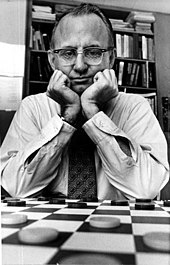Marion Tinsley
Marion Tinsley (born February 3, 1927 in Irontown , Ohio , † April 3, 1995 ) is considered the strongest checkers player who ever lived.
World championships
In 1955 and 1958, as well as in 1979, 1981, 1985, 1987 and 1989, he was world champion - i.e. initially twice and later five times in a row - in the Checkers variant and in his 45-year career did not lose a world championship fight and only seven individual games in total (two of them against the Chinook computer program ).
In 1955 he won the world title in checkers for the first time with a win against Walter Hellman (in the version Three-Move Restriction - the recognized top class of checkers). In the tournaments organized by the American Checker Federation together with the English Drafts Association , checkers are played on an 8 × 8 board according to the English rule system variant. 1962-1967 Tinsley did not take part in the world championship (he renounced his title in 1958). According to a later comment he made, the reason for this was that there was no opponent to challenge him. In 1979 he was active again until he ended his career in 1991 - against human opponents.
Man versus machine
In the 1990s, Canadian computer science professor Jonathan Schaeffer set the goal of developing a computer program that would defeat Tinsley. In 1992 and 1994 two human-against-machine tournaments took place in which the computer program Chinook was able to win two games against Tinsley, but still lost the first tournament with 2-4. Marion Tinsley was unable to finish the second tournament for health reasons: he was seriously ill with cancer.
Life
Tinsley was a Baptist pastor and professor of mathematics at Florida State University and Florida A&M University .
literature
- Jonathan Schaeffer: One Jump Ahead: Challenging Human Supremacy in Checkers. Springer, Berlin, 1998, ISBN 978-0387949307 .
- Jonathan Schaeffer: Marion Tinsley: Human Perfection at Checkers? (PDF; 73 kB) In: R. Nowakowski (Editor): Games of No Chance. MSRI Publications, 1996, ISBN 978-0521646529 .
swell
- ^ The American Checker Federation: History's Greatest Checker Players
- ^ The American Checker Federation: World Championships
- ^ A b Jonathan Schaeffer: Marion Tinsley: Human Perfection at Checkers? . In: Games of No Chance, 1996.
Web links
- Marion Tinsley - University of Alberta website
- Richard Pask: The Legendary MFT - contains a book as a PDF file with Tinsley's games
| personal data | |
|---|---|
| SURNAME | Tinsley, Marion |
| BRIEF DESCRIPTION | American world champion in checkers |
| DATE OF BIRTH | February 3, 1927 |
| PLACE OF BIRTH | Irontown , Ohio |
| DATE OF DEATH | April 3, 1995 |
